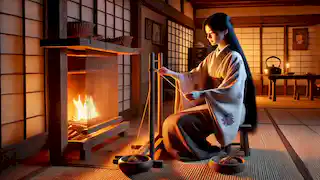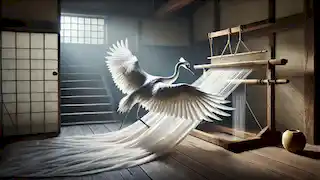In a small, serene village nestled amidst the rolling hills of Japan, there lived an old man named Takashi. He was a humble farmer, spending his days tilling the land and caring for his modest rice fields. Takashi lived alone, his wife having passed away many years ago, and the couple had no children. Despite his solitude, Takashi was content with his simple life. He found joy in the gentle rhythm of nature, in the changing seasons, and in the quiet companionship of the birds that visited his fields.
Takashi's daily life was a routine of simplicity. He would rise at dawn, his body accustomed to the early hours, and he would head to the fields with a hoe slung over his shoulder. The earth was his companion, and he treated it with the respect it deserved, knowing that it provided for him in return. The villagers admired his dedication and often spoke of how Takashi never complained about the hardships of his life. He was known for his kindness, always willing to lend a hand to his neighbors, even when his own needs were great.
One cold winter evening, as the snow fell gently from the sky, Takashi was returning home after a long day of work. The air was crisp, and the ground was covered with a thick blanket of snow. The world was silent, save for the soft crunch of Takashi's footsteps as he made his way down the narrow path that led to his home. The snowflakes danced around him, and the sky was a deep shade of twilight blue, with the first stars beginning to twinkle faintly. Suddenly, he heard a faint sound, like a soft cry, coming from the nearby forest. Curious, Takashi followed the sound until he came upon a clearing.
There, in the middle of the clearing, was a beautiful white crane. Its wings were spread out across the snow, and it seemed to be in great distress. The crane's feathers were pristine, and they shimmered in the fading light, giving the bird an almost ethereal appearance. Takashi noticed that the crane's leg was caught in a hunter's trap, and the poor bird was struggling to free itself. The sight tugged at Takashi's heart, and he felt a deep sense of compassion for the creature. Without hesitation, Takashi rushed to the crane's side. He carefully loosened the trap and freed the crane's leg. The bird gazed up at him with eyes full of gratitude, then spread its wings and took to the sky, disappearing into the cold winter night.
The crane's flight was graceful and majestic, and Takashi stood there for a moment, watching as it became a small dot in the sky. He felt a warmth in his heart, knowing that he had done the right thing. Little did he know that this simple act of kindness would change his life in ways he could never have imagined.
Several days passed, and Takashi continued with his daily routine, the memory of the crane lingering in his mind. He often wondered if the bird was safe, if it had found its way back to its flock. Winter had settled fully over the village, and the snow covered everything in a thick, white blanket. The nights were long and cold, and the villagers spent most of their time indoors, huddled around their hearths. Takashi, too, kept to his small home, his life continuing as it always had.
One evening, as he was preparing to eat a simple meal of rice and pickled vegetables, there was a knock at his door. The sound was unexpected, for it was rare for Takashi to receive visitors, especially during the harsh winter months. Surprised, Takashi opened the door to find a young woman standing outside. She was dressed in a simple kimono, and her long black hair fell gracefully over her shoulders. Despite the cold, she appeared unaffected, her cheeks rosy and her eyes bright.
The woman introduced herself as Yuki and asked if she could stay with Takashi for the night, as she had nowhere else to go. Her voice was soft and melodic, and there was something about her presence that put Takashi at ease. Touched by her plight, Takashi welcomed her into his home without hesitation. He offered her a seat by the fire, and as she warmed herself, Takashi couldn't help but feel that there was something special about this woman.
Yuki stayed with Takashi for many days, and the two quickly grew fond of each other. Yuki was kind and gentle, and she helped Takashi with his chores. She was also a skilled weaver, and one day she offered to weave a special cloth for Takashi to sell in the village. She asked for one condition: that Takashi must never look into the room where she was weaving. Takashi agreed, and Yuki locked herself in a small room, beginning her work.
For three days and three nights, Takashi heard the sound of the loom as Yuki worked tirelessly behind the closed door. The rhythmic clatter of the loom was soothing, and Takashi found himself listening to it with a sense of peace. He wondered what kind of cloth Yuki was creating, but he respected her wish for privacy and did not peek inside. Finally, on the fourth day, Yuki emerged from the room, holding a magnificent piece of cloth. The fabric was unlike anything Takashi had ever seen—soft as a cloud, and adorned with intricate patterns that shimmered like the feathers of a crane. Yuki handed the cloth to Takashi, who marveled at its beauty. She told him to take it to the village market, where he could sell it for a great sum of money.
Takashi did as Yuki instructed, and the cloth fetched an astonishing price at the market. The villagers were in awe of the fabric, and they eagerly bought it, despite its high cost. With the money, Takashi was able to buy more land and improve his home. Yuki continued to weave more cloth, each piece as beautiful as the last, and soon Takashi became a wealthy man. The villagers were amazed by the quality of the cloth and asked Takashi about the mysterious weaver. But Takashi, honoring his promise to Yuki, told them nothing.
Despite his newfound wealth, Takashi remained humble and continued to live a simple life with Yuki. However, as time went on, curiosity began to gnaw at him. He wondered how Yuki could create such extraordinary cloth and what secret she was hiding behind the closed door. He thought of the sound of the loom, of the soft, almost musical rhythm that had filled his home. What kind of magic was at work? Was Yuki truly just a skilled weaver, or was there something more to her?
One night, unable to contain his curiosity any longer, Takashi quietly approached the room where Yuki was weaving. His heart pounded in his chest as he reached for the door. He hesitated, the weight of his promise heavy on his mind. But the desire to know, to understand the mystery that had entered his life, was too strong to resist. He gently pushed the door open and peered inside.

To his shock, Takashi saw not Yuki at the loom, but a beautiful white crane, the same crane he had saved from the trap that winter night. The crane was using its own feathers to weave the exquisite cloth. Its wings moved gracefully, and the feathers it plucked from its own body shimmered in the dim light of the room. As Takashi watched in amazement, the crane suddenly stopped and turned to face him. In that moment, the crane transformed back into Yuki, her eyes filled with sadness.
"I warned you not to look," Yuki said softly, her voice tinged with sorrow. "I am the crane you saved, and I wanted to repay your kindness. But now that you have seen my true form, I cannot stay with you any longer."
Tears filled Takashi's eyes as he realized the gravity of his actions. "Please, forgive me," he begged. "I did not mean to betray your trust."
But Yuki shook her head. "I must go," she said. "But remember, my heart will always be with you, and I will forever be grateful for the kindness you showed me."
With those words, Yuki transformed back into a crane, spreading her wings wide. She took flight, circling once above Takashi's home before disappearing into the night sky. Takashi watched her go, his heart heavy with regret. The night was still, the only sound the distant cry of the wind, echoing through the mountains. Takashi stood there for a long time, staring at the empty sky, his heart aching with loss.

From that day on, Takashi lived alone once more. The wealth he had gained from Yuki's weaving meant little to him without her by his side. The villagers noticed the change in Takashi, how he no longer smiled as he once did, how he seemed to carry a heavy burden. He often wandered the forest, hoping to catch a glimpse of the crane, but she never returned. He would sit by the edge of the clearing where he had first found her, watching the sky and listening for the sound of wings. But the sky remained empty, and the forest was silent.
Yet, every winter, when the first snow began to fall, Takashi would hear the soft cry of a crane in the distance, and he knew that Yuki was watching over him. The sound would fill him with a bittersweet sense of comfort, a reminder of the bond they had shared and the love that had been lost. He would stand in the snow, his face turned to the sky, and whisper her name, hoping that somehow,
she could hear him.
As the years passed, Takashi's story became a legend in the village, a tale of kindness, gratitude, and the consequences of curiosity. The villagers often spoke of the old man who had once saved a crane and lost the woman he loved. They would tell their children the story, reminding them of the importance of keeping promises and respecting the secrets of others. The tale of the Grateful Crane became a part of the village's heritage, passed down from generation to generation, a story that touched the hearts of all who heard it.
Takashi himself grew old, but he never forgot Yuki. The seasons changed, the years slipped by, and the village around him continued to grow and thrive. But Takashi's life remained unchanged, a quiet existence marked by a deep, unspoken sorrow. He tended to his fields, now overgrown and wild, and he cared for the animals that came to visit him, just as he had done in his youth. But there was an emptiness in his life that nothing could fill.
On his deathbed, Takashi whispered her name, and those who were with him said that as he took his final breath, a crane was seen flying gracefully above his home. The villagers believed that the crane had come to guide Takashi's spirit to the afterlife, a final act of gratitude from the one he had saved so many years ago. They gathered outside his home, watching as the crane circled once, twice, three times before disappearing into the clouds.

And so, the tale of the Grateful Crane was passed down through the generations, a story that reminded all who heard it of the power of kindness, the value of trust, and the enduring bond between a humble farmer and the crane who had repaid his kindness in the most extraordinary way.
The village where Takashi had lived changed over time. New families moved in, old houses were rebuilt, and the village grew larger. But the story of the Grateful Crane remained, a constant thread that connected the past with the present. The villagers would gather on cold winter nights, sitting by their fires, and they would tell the story of Takashi and Yuki, their voices filled with reverence.
Children would listen with wide eyes, their imaginations sparked by the tale. They would ask questions, wanting to know more about the crane, about the magic that had brought her into Takashi's life. The elders would smile and tell them that some stories are meant to be mysteries, that not everything in life can be explained. And so, the legend lived on, a reminder of the beauty and tragedy that can come from the simplest acts of kindness.

As for Takashi, his memory lived on in the hearts of the villagers. They tended to his grave, which was marked by a simple stone, and they left offerings of rice and flowers, honoring the man who had shown them the importance of compassion. And every year, when the first snow fell, they would look to the sky, hoping to catch a glimpse of the crane, knowing that somewhere, Yuki was still watching over them.
And in the stillness of the night, when the world was quiet and the stars shone brightly in the sky, some said they could hear the soft cry of a crane, a sound that brought with it a sense of peace and a reminder that love, once given, is never truly lost.



















